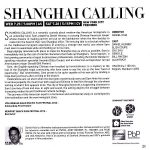From Julie Huang, PR professional and President of Kaimen Company (and AABANY member):
On Wednesday , August 1, Asian American organizations [including AABANY] hosted a special Movie Night at the IFC Center to see Alison Klayman critically-acclaimed new documentary film, “Ai Weiwei: Never Sorry”. Many attendees took advantage of the IFC promo code at the box office for this particular showing of the film. Others who cared more about convenience than the IFC community ticket promo bought their tickets on www.movietickets.com ahead of time.
One of the Asian American groups, Asian Cinevision, included this message, in its event announcement, “AI WEI WEI NEVER SORRY follows Ai Wei Wei, a political delinquent, who challenges the notion of freedom through his art and conceptual work. In a country that celebrates censorship, he makes us imagine possibilities beyond limitations: what does it mean to use art as a political tool? Ultimately, he puts out a call for transparency, but how will the Chinese government respond?”
Based on our count, 150 people came out. The crowd was multigenerational and multicultural with a wide range of reactions to the film. Attendees we spoke with told us they have no idea about what Ai Weiwei faced in China. Like what Ai Weiwei said in the film, “If it is not publicized, then it is like it never happened.” So if this film was not made or if the video footage was not taken or if people have not watched this film, then how would they know what happened. Where’s the proof, baby? I wrote some more about this film in this blog post, "Ai Weiwei: Never Sorry – Do not Wei to see this! Ai Weiwei.“ If you are looking for a more intelligent write-up, read Sue Lain Moy’s ”No Need to Apologize: Alison Klayman’s documentary, AI WEIWEI: NEVER SORRY, is a work of art and Ryan Wong’s Portrait of an Artist as a Activist | Ai Weiwei: Never Sorry.
On a yummy note, the @NesquikLiveNYC street team were nearby to hand out free bottles of Nesquik chocolate milks! Some of the moviegoers got their chocolate fix on Nesquik. Thanks Nesquik.
It was a wonderful night – chocolate milk and all!
Not in NYC and would like to see the film? Visit this page for listings in your area.
with support from the
and special thanks to






